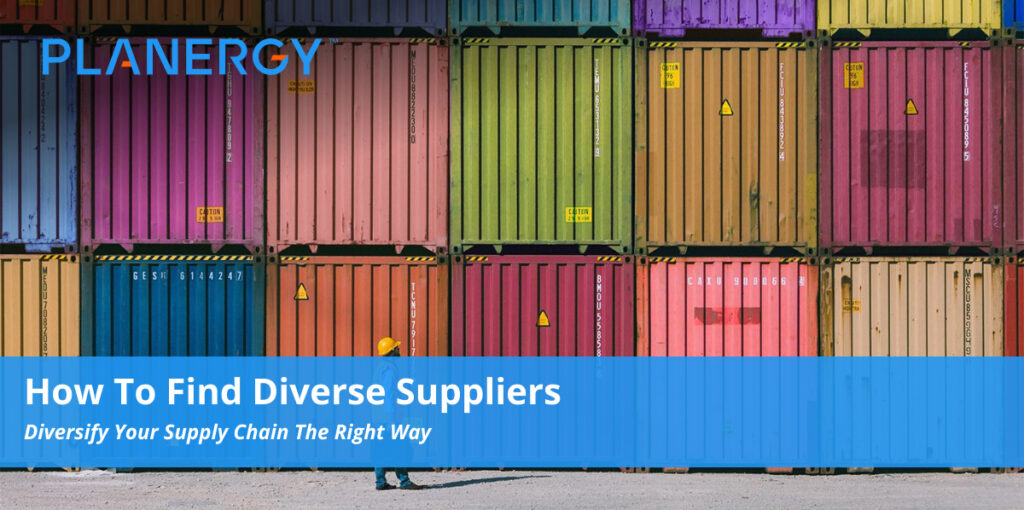Procurement teams around the world must carefully balance a range of considerations when building their organizations’ supply chains.
Resilience, agility, and risk mitigation are usually at the top of the list, but in recent years, companies have begun adding a fourth priority: diversity.
Supplier diversity is about more than certifications and potential target markets. Building a diverse supply base can give your company a foot up over the competition, enhance both your bottom line and reputation, and gain fresh perspectives that contribute lasting value—all while allowing your company to invest in its community and the success of diverse businesses.
Understanding how to find diverse suppliers and bring them into the fold can go a long way in helping you meet not only the goals of your supplier diversity program, but your organizational goals for social responsibility and financial success.
What Does “Diverse Supplier” Mean?
Generally speaking, diverse suppliers are those companies and organizations owned by minorities, women, members of the LGBTQ community, disabled individuals, the economically disadvantaged,and military veterans.
Companies who qualify and wish to promote themselves as a diverse business can obtain certification from various organizations.
In the United States, for example, suppliers can qualify for a number of different diversity certifications:
- Minority-owned business enterprises (MBEs) are certified by the National Minority Supplier Development Council (NMSDC).
- Woman-owned business enterprises (WBEs) are certified by the Women’s Business Enterprise National Council (WBENC).
- LGBTQ-owned business enterprises are certified by the National LGBT (Lesbian, Gay, Bisexual, and Transgender) Chamber of Commerce (NGLCC).
- Business enterprises owned by disabled individuals are certified by Disability:IN.
- Business enterprises owned and operated by individuals who have faced prejudice based on their ethnic or racial identities can certify their businesses as Small Disadvantaged Businesses through the S. Small Business Administration. (SBA)
- Veteran-owned business enterprises can be verified by the S. Department of Veterans Affairs to compete for veteran-related set-asides. In addition, these businesses can be certified as veteran-owned by either (or both) the National Veteran Business Development Council (NVBDC) or the National Veteran-Owned Business Association (NaVOBA).
- Businesses operating in historically underutilized business zones (HUBZONES) can also apply for certification through the SBA.
Organizations seek to add certified diverse suppliers to their supply chain as part of a supplier diversity program.
These programs are developed internally and designed to help the organization improve its supply chain health while practicing social responsibility, investing in its community, and adding soft value through improved reputation, sustainability, capturing new markets, etc.
Understanding how to find diverse suppliers and bring them into the fold can go a long way in helping you meet not only the goals of your supplier diversity program, but your organizational goals for social responsibility and financial success.
The Benefits of a Diverse Supply Chain
While creating and implementing a vendor diversity program might require some extra planning and effort, the rewards can be substantial.
In addition to the reputational benefits, the satisfaction of corporate social responsibility, and potential for innovation and market growth that come with a range of different perspectives and capabilities, companies who implement supplier diversity programs gain a range of financial and competitive benefits, including:
-
Exceptional Supplier Performance
99% of diverse suppliers meet or exceed client expectations; nearly a fourth exceed them. Reliability, clear communication, and exceptional performance are more important than ever in a world where supply chains are threatened by pandemics, natural disasters, and international political conflict.
-
Broader and Deeper Strategic Sourcing
Both agility and resilience benefit from a more diverse supply chain. In addition, diverse suppliers may possess specific expertise that can help organizations achieve greater savings through alternative materials or greater market penetration with target demographics.
-
Competitive Parity
World-class procurement organizations devote 33% more to diversity spend than the average company. Companies who dedicate at least 20% of their spend to diverse suppliers can expect 10%-15% of their total sales to come from that investment.
The Best Tools for Finding Diverse Suppliers
Before you can establish and benefit from relationships with diverse suppliers, you need to know how to find them. You could certainly begin your hunt in the search bar of your browser or at the specific websites of certification sites like the NGLCC or NMSDC.
But if you’re looking to reach the largest number of potential suppliers possible, consider taking a look at some of the most powerful and commonly used resources available today:
-
Supplier.io’s Supplier Explorer
Tapping into hundreds of certification agencies and providing detailed information on suppliers worldwide.
Supplier.io’s supplier diversity sourcing tool gives you powerful options for identifying your needs, selecting the suppliers who fit your requirements, and sharing information between key stakeholders.
The service itself comes with a 14-day free trial, so you can give it a test drive to see if it fits your needs before committing.
-
Thomasnet.com’s Supplier Diversity Tools
With more than a century of experience connecting suppliers with clients and providing valuable insights to both.
Thomasnet gives users intuitive tools for finding and recruiting diverse suppliers based on a range of criteria. Users can search by categories such as African American owned, women owned, veteran owned, etc., or sample a broader range of suppliers in different categories who are also HubZone certified.
Signing up for a basic membership is free, and allows full access to the search tools so you can get cracking right away.
-
The Association of National Advertisers (ANA) Supplier Diversity Resources
In addition to a curated list of certified diverse suppliers in both PDF and Microsoft Excel formats, this marketing-focused organization also provides users with free access to a companion document of suppliers whose clients predominantly include multicultural and diverse audiences.
-
Dun & Bradstreet Supplier Diversity Data Resources
Signing up for D&B’s supplier diversity services gives users access to a veritable cornucopia of diversity data drawn from more than 400 sources.
With a database of more than 5.3 million classifications covering more than 20 million small business indicators, you can add diverse vendors to your list of current suppliers with ease.
D&B also allows users to filter potential suppliers for specific corporate, industry, and governmental requirements.
It also provides a filtering service to eliminate suppliers with violations recorded by the Occupational Safety and Health Administration (OSHA), as well as those currently on government control lists such as the Office of Foreign Asset Control (OFAC) Sanctions program.
-
The Small Business Association’s Dynamic Small Business Search Tool
Covering a wide array of government and private certifications, the SBA’s free search tool can help you narrow your search for diverse suppliers in just a few clicks. In addition to diversity certifications, users can also search by sustainability and “green” certifications, size, quality standards, insurance bonding, and much more.
-
The Small Business Exchange (SBE)
Billing itself as the “ultimate business information hub for small businesses, disadvantaged, Asian, Black, Hispanic Women and Disabled Western-owned Business,” the SBE provides a range of services to diverse businesses.
But it also has services for would-be clients, including a targeted diversity outreach program designed to connect buyers with the ideal suppliers meeting their specific needs.
Embrace Supplier Diversity for Smarter Sourcing and Shared Success
Taking on the challenges presented by doing business today’s complex and competitive economy isn’t easy.
And finding diverse businesses that can help you reach your goals can seem daunting.
But with a well-developed sourcing strategy that prioritizes supplier diversity and the right resources, you can identify and recruit diverse suppliers who will help you earn a maximum return on your dollar while strengthening your supply chain, providing unique insights, and give your company an opportunity to invest in shared success.




